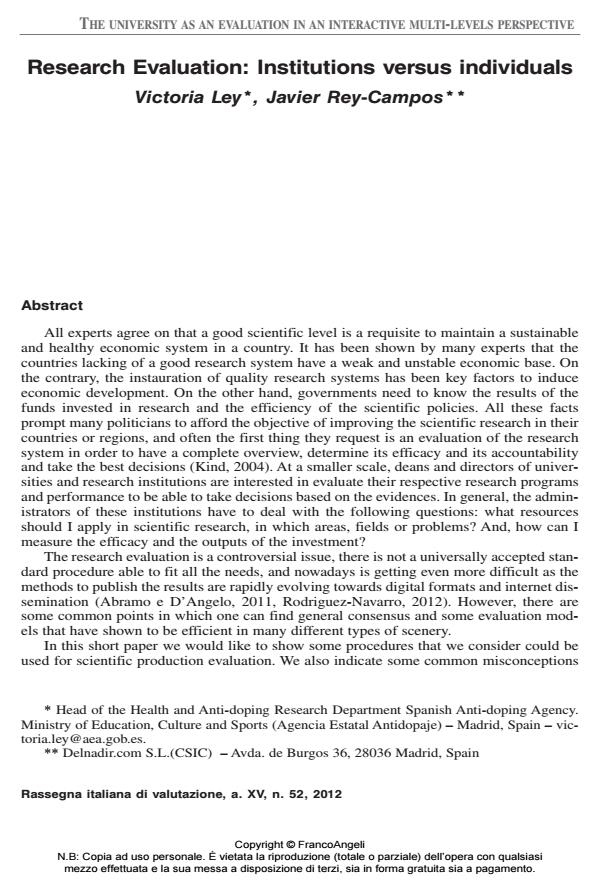Research Evaluation: Institutions versus individuals
Titolo Rivista RIV Rassegna Italiana di Valutazione
Autori/Curatori Victoria Ley, Javier Rey-Campos
Anno di pubblicazione 2013 Fascicolo 2012/52 Lingua Italiano
Numero pagine 11 P. 55-65 Dimensione file 1840 KB
DOI 10.3280/RIV2012-052005
Il DOI è il codice a barre della proprietà intellettuale: per saperne di più
clicca qui
Qui sotto puoi vedere in anteprima la prima pagina di questo articolo.
Se questo articolo ti interessa, lo puoi acquistare (e scaricare in formato pdf) seguendo le facili indicazioni per acquistare il download credit. Acquista Download Credits per scaricare questo Articolo in formato PDF

FrancoAngeli è membro della Publishers International Linking Association, Inc (PILA)associazione indipendente e non profit per facilitare (attraverso i servizi tecnologici implementati da CrossRef.org) l’accesso degli studiosi ai contenuti digitali nelle pubblicazioni professionali e scientifiche
All experts agree on that a good scientific level is a requisite to maintain a sustainable and healthy economic system in a country. It has been shown by many experts that the countries lacking of a good research system have a weak and unstable economic base. On the contrary, the instauration of quality research systems has been key factors to induce economic development. On the other hand, governments need to know the results of the funds invested in research and the efficiency of the scientific policies. All these facts prompt many politicians to afford the objective of improving the scientific research in their countries or regions, and often the first thing they request is an evaluation of the research system in order to have a complete overview, determine its efficacy and its accountability and take the best decisions (Kind, 2004). At a smaller scale, deans and directors of universities and research institutions are interested in evaluate their respective research programs and performance to be able to take decisions based on the evidences. In general, the administrators of these institutions have to deal with the following questions: what resources should I apply in scientific research, in which areas, fields or problems? And, how can I measure the efficacy and the outputs of the investment? The research evaluation is a controversial issue, there is not a universally accepted standard procedure able to fit all the needs, and nowadays is getting even more difficult as the methods to publish the results are rapidly evolving towards digital formats and internet dissemination (Abramo e D’Angelo, 2011, Rodriguez-Navarro, 2012). However, there are some common points in which one can find general consensus and some evaluation models that have shown to be efficient in many different types of scenery. In this short paper we would like to show some procedures that we consider could be used for scientific production evaluation. We also indicate some common misconceptions that should be avoided. We do not pretend to write an evaluation guideline, but rather our particular opinion from our experience, particularly in the Spanish context.;
Keywords:Evaluation methods, bibliometric indicators, scientific performance indicators
- The Impact of Innovation-Driven Strategy on High-Quality Economic Development: Evidence from China Wensheng Xiao, Haojia Kong, Lifan Shi, Valentina Boamah, Decai Tang, in Sustainability /2022 pp.4212
DOI: 10.3390/su14074212
Victoria Ley, Javier Rey-Campos, Research Evaluation: Institutions versus individuals in "RIV Rassegna Italiana di Valutazione" 52/2012, pp 55-65, DOI: 10.3280/RIV2012-052005